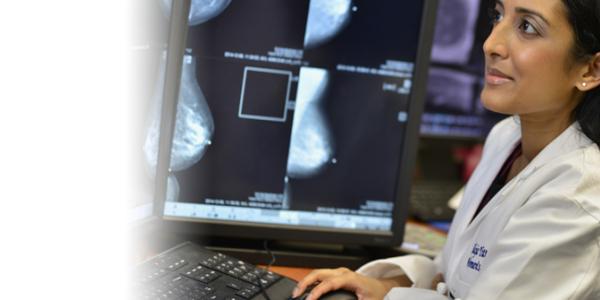
They number in the millions, thanks to better screening and advances in treatment. But with more than 40,000 deaths from breast cancer each year, we still have a long way to go.
As director of breast imaging at El Camino Hospital, I see firsthand the difference women can make in their own lives if they have access to the right information and resources. That’s why I’m committed to fighting breast cancer through education, regular screening, early diagnosis and prompt, personalized treatment. When it comes to protecting yourself, knowledge is power — but only if you use what you know.
Skip
Screening and diagnostics: Better than ever
The most important thing you can do to fight breast cancer is get regular mammograms. Modern digital mammography can detect cancer in early stages, when the survival rate is up to 98 percent. Guidelines are a subject of some debate, but I recommend yearly mammograms beginning at age 40 for most women. Some women may need a baseline at a younger age, so talk to your doctor or gynecologist about your risk.
If a mammogram shows an abnormality, don’t panic. Most abnormalities are not cancer, but it’s important to have it checked out promptly. The next step may be additional mammograms or ultrasound.
If cancer can’t be ruled out, you’ll need a biopsy, which can usually be done as an outpatient procedure. If you do have cancer, and you’ve been getting regular mammograms, the odds are dramatically in your favor for successful treatment and recovery.
Understanding your risk factors
There are some things you can do to help lower your risk of breast cancer. Staying active and maintaining a healthy weight may help protect you. Having a baby before age 35 and breastfeeding may offer some protection. Also, some forms of hormonal therapy and birth control may affect your risk, so talk to your doctor about what’s best for you.
Unfortunately, most other risk factors are not controllable. Being aware of them can help you and your doctor take the right steps to detect cancer as early as possible. Some examples:
- Your age. Most breast cancer is diagnosed after age 50.
- Your age when you stop and start menstruating. The sooner you start and the later you stop, the higher your risk.
- Your breast density. Having dense breast tissue can increase your risk and make detection more difficult.
- Personal or family history of breast cancer. If you or your mother, sister or daughter have had breast cancer, your risk is higher.
- Genetic mutations. Inherited changes to certain genes, such as BRCA1 and BRCA2, can increase risk of breast and ovarian cancer. If you have a family history of breast cancer, genetic testing may be recommended.
Breast density and your breast cancer risk
About 40-50% percent of women have dense breast tissue. A mammogram can tell you if you are in this group. Having dense breast tissue can increase your risk slightly and may also make detection more challenging. There are no special screening recommendations for women with dense breasts. But additional screening methods, such as whole breast ultrasound , can help improve detection. Talk to your doctor or breast imaging specialist about what might be best for you. Insurance, Medicare or Medicaid will often cover additional screening methods if they are needed.
A brighter future
Breast cancer survival rates have improved dramatically in the past three decades, and that trend is likely to continue. Every day, researchers are working on new or improved methods of diagnosis and treatment. Some examples are new chemotherapy drugs, targeted genetic therapy and hormone therapy for specific kinds of breast cancer. Also, quality of life after breast cancer has improved significantly and will continue to do so, with less invasive surgical techniques and much better results for women who desire breast reconstruction.
My hope — and a distinct possibility — is that our daughters and granddaughters will not have to fear breast cancer the way previous generations have. In the meantime, they’ll benefit from your good example. So don’t be afraid — but be diligent about screening and follow-up. Your breasts and loved ones will thank you.
The Women's Imaging Center at El Camino Hospital is dedicated to being your partner in breast care. We offer advanced screening with 3D digital mammography, and the latest technologies in ultrasound and MRI. Our team of experts can work with you to determine your personal risk, and make recommendations for screening and maintaining healthy breasts. For more information, and to make an appointment, please call us at 650-940-7050 or visit us online at www.elcaminohealth.org.
This article first appeared in the October 2018 edition of the HealthPerks newsletter.

